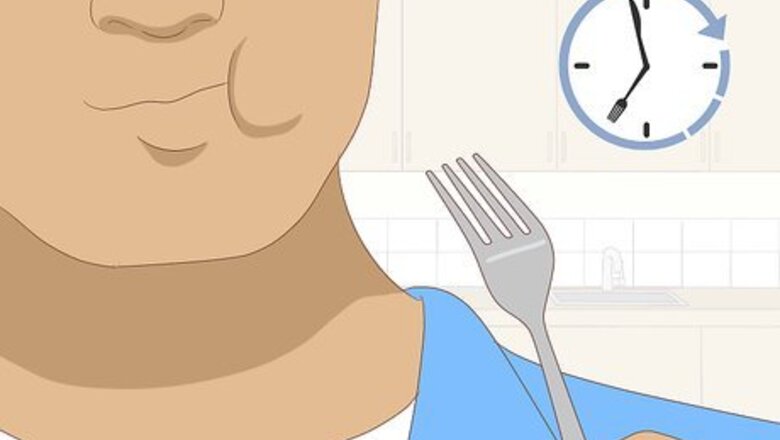
views
X
Trustworthy Source
Mayo Clinic
Educational website from one of the world's leading hospitals
Go to source
This can be pretty uncomfortable and annoying, but, luckily, there are many ways to handle the condition. Your doctor may suggest medication, but even with medical treatments, make some dietary and lifestyle changes to manage your symptoms.[2]
X
Trustworthy Source
Harvard Medical School
Harvard Medical School's Educational Site for the Public
Go to source
Helpful Eating Habits
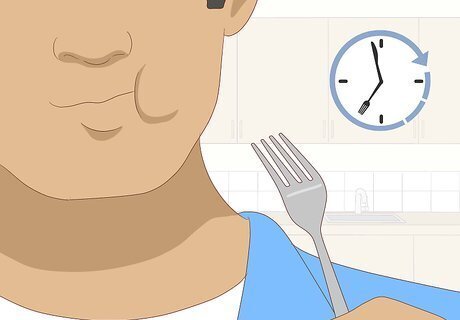
Eat slowly so you don’t get too full. Eating too fast could lead to overeating, which often triggers acid reflux. Make an effort to eat more slowly at every meal. Try forcing yourself to eat slower by putting down your fork after every bite. Don’t pick it up again until you’ve swallowed the previous bite.
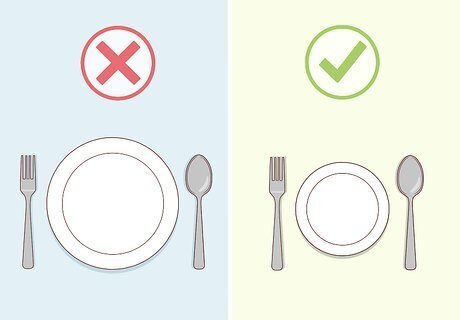
Eat smaller meals so you don’t feel too full. Eating 3 large meals a day could fill you up too much and make your stomach produce more acid. Try eating a few smaller meals throughout the day instead of 3 large ones.
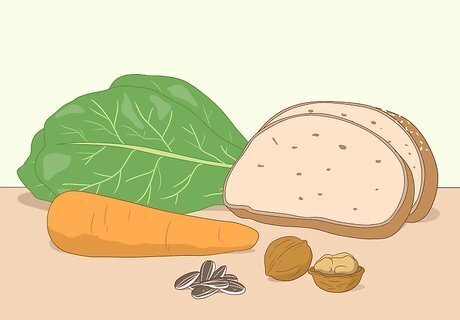
Add more fiber to your diet. Foods high in fiber make you feel fuller than low-fiber foods, which can keep you from overeating. Try including more fiber in your diet to see if it helps. Good high-fiber foods include whole grains, nuts, seeds, root vegetables, and leafy green vegetables. You can also get more fiber from supplements, but doctors recommend getting as much as possible from your regular diet first.
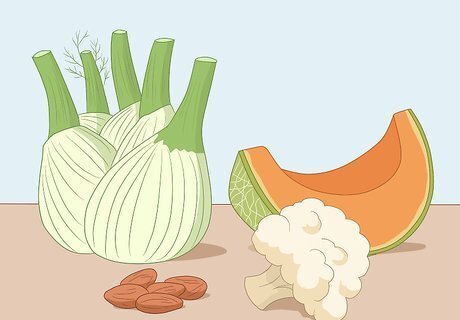
Neutralize stomach acids with alkaline foods. Alkaline foods are higher on the pH scale, meaning they counteract stomach acids and can prevent heartburn. Add more alkaline foods to your diet to get some relief. Good alkaline foods include bananas, nuts, melons, cauliflower, and fennel.
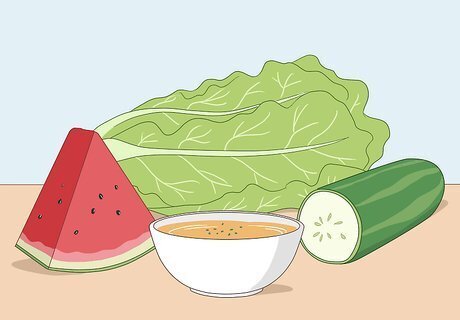
Eat watery foods to dilute the acid. Water can dilute stomach acids and reduce the burning sensation from acid reflux, so mix some watery foods into each meal. Try celery, melon, cucumber, lettuce, and broths or soups.
Foods to Avoid
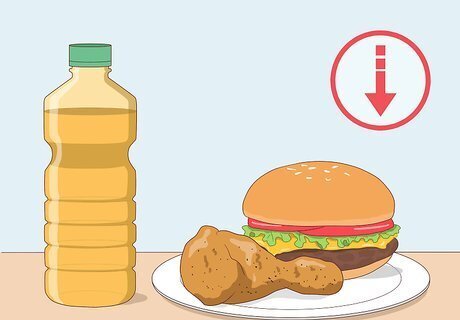
Reduce the amount of fat you eat. Fat tends to make acid reflux worse. Try to follow a low-fat diet to minimize the acid in your stomach. Fried and processed foods are especially fatty and greasy, so keep these to a minimum. Use less oil or butter when you cook. Try switching to low-fat dairy products.
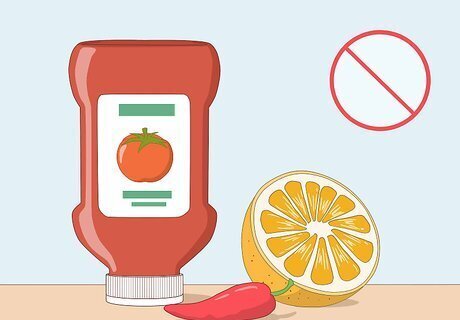
Cut out spicy and acidic foods. These foods are some of the biggest triggers for acid reflux. If you notice that your symptoms get worse after having spicy or acidic meals, stop eating those foods to avoid upsetting your stomach. Common spicy foods include cayenne, chili peppers, curries, and many types of peppers. Acidic foods include citrus fruits, tomatoes, and some marinara sauces and condiments. You can still eat these foods if they don’t trigger your symptoms. Some people can tolerate them better than others.
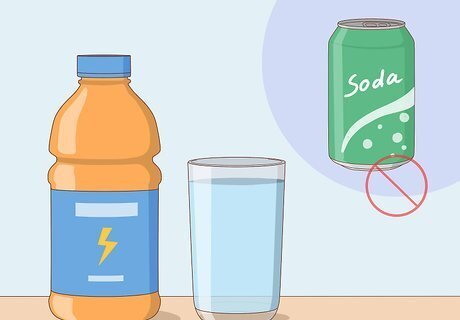
Drink non-carbonated beverages. Bubbly drinks can push stomach acid into your esophagus during a meal. Choose flat beverages rather than carbonated ones. Plain water is best, so make that your main drink.

Limit the amount of coffee you drink. Coffee is very acidic and can worsen acid reflux. If you regularly drink a lot of coffee, cut back a bit to reduce the acidity of your stomach. Decaff coffee may be easier on your stomach, but it can still trigger symptoms. It’s not the caffeine that’s the problem, it’s the acidity of the coffee.
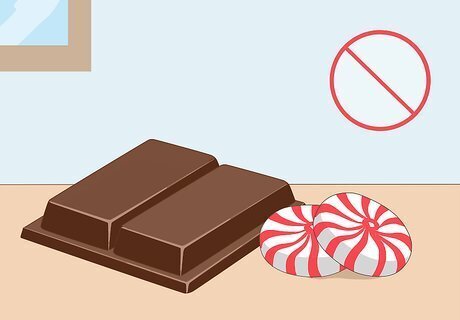
Avoid chocolate and peppermint. These two items, in any amounts, can also trigger heartburn. If they regularly aggravate your symptoms, then avoid them altogether.
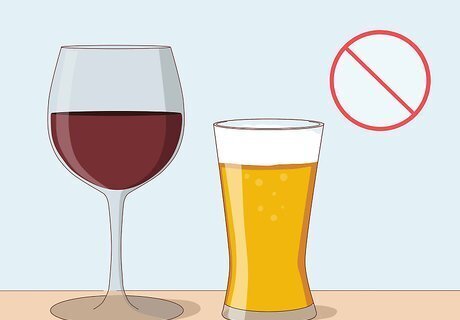
Cut out alcohol if it bothers your stomach. Alcohol is also a common trigger for heartburn and acid reflux. If your symptoms usually act up after drinking, then cut back and see if that helps. If you usually feel heartburn after drinking any alcohol, even a small amount, then it might be best to avoid it entirely.
Lifestyle Tips

Wear loose-fitting clothes. Tight clothing, especially around your tummy, can push acids out of your stomach and trigger heartburn. Choose loose-fitting pants, shirts, and belts, especially when you’re eating.
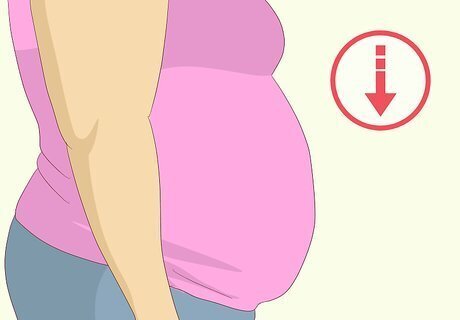
Lose weight if you need to. Being overweight puts you at a higher risk for acid reflux and can make your symptoms worse. If you’re overweight, speak with your doctor to determine a healthy weight for yourself. Then follow a diet and exercise regimen to reach and maintain that weight. Lose weight in a healthy way, not with a crash or extreme diet. These are dangerous and people often regain weight when they stop the diet.
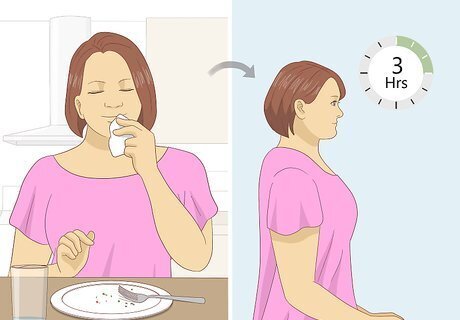
Sit or stand upright for at least 3 hours after you eat. Laying back can cause acids to drip out of your stomach into your esophagus, triggering acid reflux. Don’t lay back on the couch or in bed after eating. Instead, stay standing or sitting upright for at least 3 hours afterward. Don’t eat for a few hours before bedtime, as this can cause nighttime acid reflux.
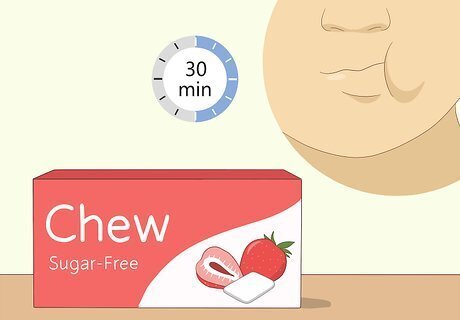
Chew sugar-free gum after eating. Chewing gum leads to more frequent swallowing, which pushes acid back down into your stomach. Studies show that chewing sugarless gum for 30 minutes after eating has some success in preventing acid reflux. Avoid peppermint-flavored gum, since this can cause heartburn.
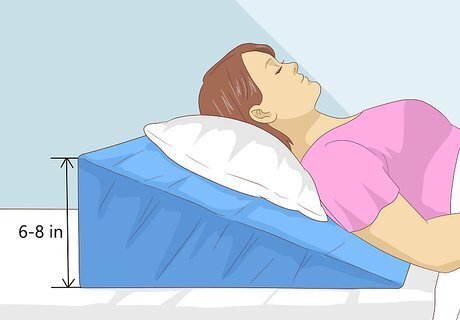
Elevate your upper body while you sleep. Nighttime heartburn is common if you lay flat because acid can leak into your esophagus. Try to raise the head of your bed or use foam supports to lift your head 6–8 in (15–20 cm) above your feet. Don’t use extra pillows to raise your head. This provides uneven support and could cause back or neck pain.
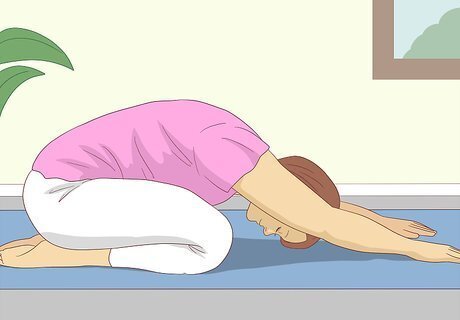
Reduce stress to avoid triggering your symptoms. There is a definite link between chronic stress and acid reflux. If you regularly feel stressed, then taking some steps to relieve stress in your everyday life could make a big difference. Try making time each day for some relaxation exercises like meditation, deep breathing, or yoga. Doing things you enjoy is also good for fighting stress, so make some time for your hobbies each day as well. If you have trouble reducing your stress, then talking to a professional therapist or psychiatrist can be a big help.

Quit smoking or don’t start in the first place. Smoking puts you at a higher risk for acid reflux. It’s best to quit as soon as possible to avoid health issues. If you don’t smoke, then avoid starting altogether. Secondhand smoke can also cause health problems, so don’t let anyone smoke in your home either.
Herbal Remedies
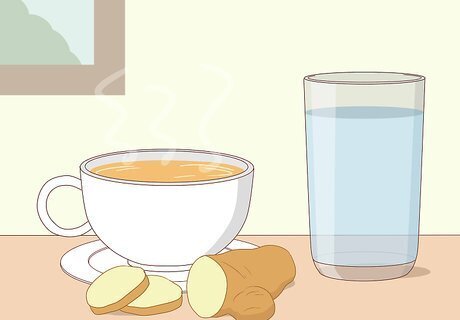
Sip ginger tea or water. Ginger is a well-known and effective treatment for acid reflux. Try grinding some fresh ginger into tea or a glass of water and sipping on it if you feel heartburn coming on. Suggested amounts of ginger range from 250 mg to 5 g per day, so it’s safe in high amounts.
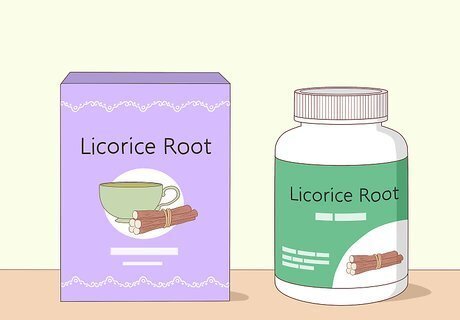
Soothe your stomach with licorice root. Licorice is another common treatment for acid reflux that shows some success. You can take it as a tablet or in tea form when you start feeling heartburn starting. If you take tablets, don’t use them for longer than a week without asking your doctor if this is safe. Licorice root is safe in amounts up to 1 g per day.

Try chamomile tea when your symptoms start. Chamomile tea has a soothing effect on the stomach. If you feel heartburn starting after a meal, try having a cup of tea to ward of your symptoms. Chamomile is in the same plant family as ragweed, so don’t use it if you’re allergic to ragweed. It could cause a minor allergic reaction.
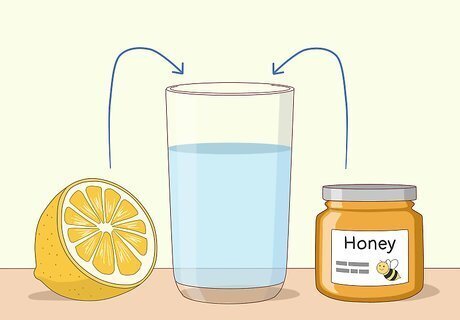
Drink honey and lemon water if your heartburn has already started. This home remedy could neutralize some of your stomach acid. If you're suffering from heartburn, try mixing some lemon juice and honey in a glass of water and drinking it to see if it helps. Lemon juice is too very acidic, so don’t use any without diluting it in water first.
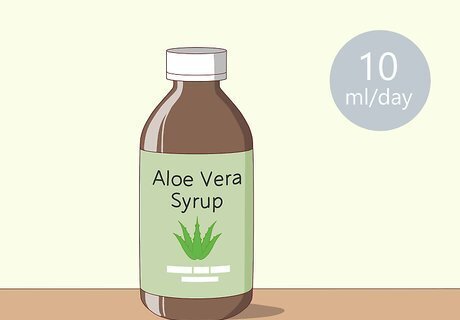
Take aloe vera syrup to prevent reflux. Aloe vera syrup administered daily shows some success in preventing acid reflux. Try having 10 mL per day to see if this helps you.

Use milk if it doesn't make your heartburn worse. Milk is a common home remedy for acid reflux, and it can neutralize stomach acid. However, since it contains fat, it could also make the problem worse. If you notice that you feel more burning later on after drinking milk, then avoid using this as a home remedy.
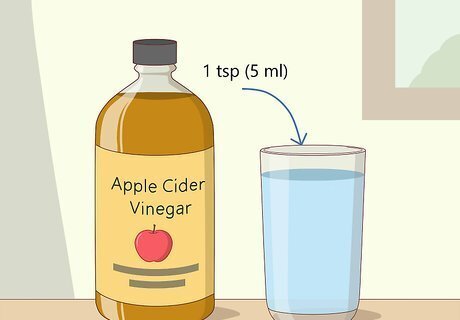
Try diluted apple cider vinegar if you want to. This is a common home remedy, but there's no evidence proving that it works. If you want to try it, then there's probably no harm in it. Add 1 tsp (5 ml) to a glass of warm water and drink it after a meal to see if this prevents your heartburn symptoms. Never drink undiluted vinegar. This is very acidic and will upset your stomach.















Comments
0 comment